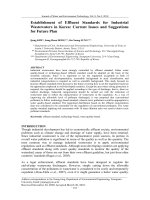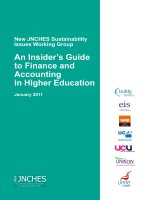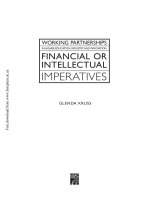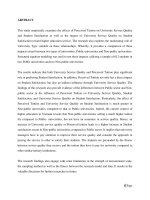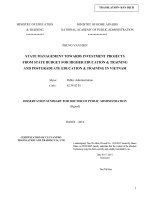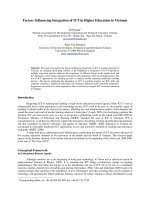Advancing sustainability in higher education Issues and opportunities for research
Bạn đang xem bản rút gọn của tài liệu. Xem và tải ngay bản đầy đủ của tài liệu tại đây (73.98 KB, 11 trang )
The research register for this journal is available at
/>
The current issue and full text archive of this journal is available at
/>
Advancing sustainability in
higher education
Advancing
sustainability in
higher education
Issues and opportunities for research
John Fien
243
Griffith University, Brisbane, Australia
Keywords Sustainable development, Higher education, Research
Abstract This paper explores issues related to the choice of goals and approaches for advancing
sustainability in higher education through research. The paper argues that the diverse nature of
the questions, issues and problems facing advocates of sustainability in higher education requires
a willingness to adopt an eclectic approach to the choice of research methodologies or paradigms.
The views of reality and knowledge embedded in alternative research paradigms – empirical
analytical, interpretive, critical, and poststructural paradigms – are summarised briefly. The
relevance of the four paradigms is illustrated by taking two issues of sustainability in higher
education and exploring how they would be addressed by each one. The two issues are: campus
catering services and integrating the principles of the Earth Charter into an engineering degree
program. The paper concludes by reviewing the debate over whether this eclectic position is
consistent with the goals of advancing sustainability in higher education.
What is a more appropriate form of environmental education research? . . . [I]t is one which
includes consideration of both human consciousness and political action and thus can answer
moral and social questions about educational programs which the dominant form [of research
paradigm] cannot. It is one which is more consistent with the ecophilosophical view – which
encourages individuals to be autonomous, independent critical and creative thinkers, taking
responsibility for their own actions and participating in the social and political
reconstructions required to deal intelligently with social/environmental issues within
mutually interdependent and evolving social situations (Robottom and Hart, 1993, pp. 51-2).
A diverse range of publications, including conference proceedings, edited
collections and the specialist International Journal of Sustainability in Higher
Education, as well as other journals, now contain many reports on studies that
have sought to advance sustainable development in the curriculum and
operations of higher education systems and institutions. These studies
generally focus on one or more of the ecological, economic, equity or political
pillars of sustainable development (Yencken and Wilkinson, 2000). Examples
include studies of: the results of campus audits for assessing and monitoring
the ecological footprint of a campus; strategies for advancing economic
sustainability through the financial savings possible with energy conservation
and ‘‘green purchasing’’ policies; the results of race, gender and disability
programs in promoting social sustainability; and the negative impacts of neoliberalist forms of governmentality on the political sustainability of higher
education. Issues such as these are addressed in the case studies in this special
issue also.
The researchers who conduct studies such as these, especially those
involved in the last two types of examples, may not necessarily identify their
International Journal of
Sustainability in Higher Education,
Vol. 3 No. 3, 2002, pp. 243-253.
# MCB UP Limited, 1467-6370
DOI 10.1108/14676370210434705
IJSHE
3,3
244
research with the goals of sustainable development. This may be because many
scholars outside the mainstream environmental field do not yet recognise the
significance of sustainable development to their research. The higher education
sustainability movement is relatively new and has not yet been able to reach
out to all scholars and university managers. It may also be that many, if not
most, advocates of sustainability in higher education have tended to come from
the fields of environmental studies, education, and facilities management and,
thus, have tended to concentrate on the economic and ecological pillars of
sustainability, and have not often seen the relevance of sociological, political
science and cultural studies research to their goals.
Consequently, much research on sustainability in higher education does not
address the four pillars of sustainability in a holistic, interdependent and
systemic way. This is a key problem that attention to alternative paradigms of
research may help to redress. It may also help redress several related problems
that characterise much current research in this area. One of these is the
predominantly descriptive orientation of research in this field. For example,
most research reports[1] could be seen to fall into one of four categories:
(1) arguments about the need for reform of curriculum and environmental
management practices in higher education (or what Lidstone (1988)
called research of the ‘‘good advice type’’);
(2) surveys, summaries and descriptions of sustainability initiatives in one
or more institutions;
(3) narrative accounts of the experience of institutional change; or
(4) audit reports of the economic and ecological benefits of successful
projects and programmes.
Important and interesting as this work is, it remains predominantly
atheoretical in that few studies have sought to go beyond description to include
a critical and theoretical analysis of findings or to ground explanations in social
or organisational theory. Comparative research that draws on corporate
sustainability initiatives (or other forms of organisational change) in other
public or private sector organisations is similarly missing. Another problem
with the majority of studies is a lack of rigorous research designs. For example,
few reports contain a comprehensive account of how data were collected and
analysed, or of how issues of validity, reliability and ethics were managed.
Such problems are indicators of the advocacy and early ‘‘honeymoon’’ phases of
the innovation process and, given the relative newness of the sustainability in
higher education movement, an understandable aspect of its research culture.
Research on sustainability in higher education is a subset of educational
research and much can be gained from considering contemporary debates in
this field. Thus, this paper has not been written as a guide to what
sustainability issues in higher education need to be researched and how.
Rather, the paper has been written as an introduction to current thinking in
educational research for academics and university managers who are
interested in the potential of research to guide and enhance sustainability
Advancing
projects but who may not have a background in educational research. In sustainability in
particular, the paper outlines four broad approaches – or paradigms – that may higher education
be used to research issues of sustainability in higher education. These are the
empirical-analytical, interpretive, critical, and post-structuralist approaches to
research.
245
It is possible to see discussions about paradigms as being too philosophical
and to criticise them for diverting efforts away from the ‘‘real business’’ of
getting research done, improvements put into place, and papers published.
However, such concerns tend to reflect a view of research as a technical activity
only. The philosophical emphasis of this paper is not meant to detract from
technical proficiency – or productivity – in research. Rather, it is anticipated
that the discussion will lead to improvements in the appropriateness and
technical proficiency of research. Indeed, experienced researchers who have
attended workshops I have facilitated on such issues in research have often
expressed surprise that they had not considered such issues before. The
surprise often comes when the analysis of paradigmatic questions leads to
discussions about ethical issues in the research enterprise. Key ethical
questions about the practice of research that have arisen in these workshops
include: what criteria can be used to judge whether a research topic is
worthwhile? What criteria inform judgements about the appropriateness of
particular data collecting and analysis techniques? What views about the
nature of reality, epistemology, and human behaviour are subsumed in such
criteria? Who owns the data we collect? Who has the right to use the findings of
our research? And is the research really ‘‘ours’’ anyway? Is the presumed linear
relationship between research, dissemination and adoption appropriate,
particularly when a problem is acute and managers cannot afford to wait until
all data have been analysed and the findings validated? And how ought the
uncertainty of any scientific conclusion be factored into policy and decision
making?
Such questions highlight a very important aspect of research – that research
is a personal, ethical and political enterprise as well as a technical one. Research
is personal because individual and institutional values guide decisions on
topics to be researched and the methods to be used. Research, especially on
sustainability issues, is ethical because it invariably involves our interaction
with other humans and/or some parts of non-human nature – and how are we
to relate to and respect the rights and dignity of ‘‘them’’?
‘‘Them’’ was placed in quotation marks to draw attention to this ethical
point. According to the syntax of the last sentence, ‘‘them’’ refers to other people
and to parts of the natural environment. It is not common in Western society to
refer to aspects of non-human nature as ‘‘them’’; most often we say ‘‘it’’. Thus,
even our choice of words reflects the ethical nature of research. Another
example to think about is whether we should call the humans who help provide
us with data ‘‘objects’’ or ‘‘subjects’’ in the study? Most people answer this
question by saying that they prefer to use ‘‘objects’’ to refer to non-human
IJSHE
3,3
246
nature and ‘‘subjects’’ to refer to people. An important distinction in
environmental philosophy and ethics is being made in this view. For example,
how would the ethics and the process of research be different if we chose to call
non-human ‘‘objects’’ our ‘‘partners’’ in the study or our human ‘‘subjects’’ as
‘‘participants’’ or ‘‘co-researchers’’ in the study? The language we choose to use
in research is important as these alternative words point to new configurations
of ethics and power in a study. For example, as ‘‘participants’’ not ‘‘subjects’’,
the people with whom we conduct research come to have rights, as
stakeholders, in the direction, processes and outcomes of a study. As coresearchers, these rights would appear even stronger. The issues of power and
rights in research point to the inevitably political nature of research.
Research is political in the sense that politics refers to issues of power
between people. Power is a key issue in deciding whether we call people who
provide us with data ‘‘subjects’’, ‘‘participants’’ or ‘‘co-researchers’’. The politics
of research also comes into play in decisions about who is allowed a say in
decisions about how data will be collected, how and by whom it will be
validated, how policy and planning decision makers will use the findings, and
where and by whom any papers will be published. Power is also involved in the
allocation of resources to support different types of research projects. What sort
of research about sustainability in higher education is needed? Who decides
such questions? How do they justify such decisions? By what criteria and
authority? Emphasising research as a personal, ethical and political process
draws attention to the need to consider the paradigmatic nature of various
research undertakings.
Four research paradigms
van Manen (1990, p. 27) describes research paradigms as comprising ‘‘the
fundamental assumptions’’ about ‘‘the general orientation to life, the view of
knowledge, and the sense of what it means to be human’’ that direct particular
modes of enquiry. Thus, paradigms include theories about the nature of reality
and knowledge, ways of discovering knowledge, and making judgements
about the validity and authenticity of findings. As Denzin and Lincoln (1994,
p. 14) note, decisions about research designs reflect the coordinated framework
of ‘‘skills, assumptions, and practices that researchers employ as they move
from their paradigms to the empirical world’’. In other words, developing a
research design involves the practical application of a chosen research
paradigm. Thus, research design and methods cannot be separated from the
paradigm or underlying assumptions upon which the research is based.
Lather (1992) has identified four paradigms or methodologies of research:
the positivist or empirical-analytical, the interpretivist, the critical and the
poststructural. Each of these, she argues, has been developed to provide a
philosophical framework for addressing particular types of research tasks.
Lather describes the central tasks of the four paradigms as follows:
(1) to describe, control and predict – the empirical-analytical paradigm,
involving positivist and postpositivist approaches;
(2) to empathise and understand – the interpretive or hermeneutic
Advancing
paradigm;
sustainability in
(3) to change – the critical paradigm; and
higher education
(4) to deconstruct – the poststructural paradigm.
Each of these paradigms has an appropriate role to play in educational
research, depending on the type of problem being investigated. For example, all
four are used in environmental education research although the empiricalanalytical paradigm has been the most dominant until recent years (Robottom
and Hart, 1993). This dominance is a function of the centrality of psychological
concepts in the behaviouristic approaches to personal and institutional change
embedded in much thinking and practice in environmental education and
management. However, such behaviouristic approaches have come into
question in recent years due to their failure to consider the significance of
personal experience and social structure on the nature and outcomes of
environmental learning (Robottom, 1995).
Robottom and Hart (1993) have examined the ontological, epistemological,
and methodological assumptions in environmental education research, teasing
apart the experimental and quasi-experimental aspects of the empiricalanalytical tradition into positivist and postpositivist paradigms respectively.
Table I is based upon their ideas.
These four paradigms can be illustrated by taking two issues of sustainability
in higher education and exploring how they would be addressed by each
paradigm. The two issues are:
(1) campus catering services; and
(2) integrating the principles of the Earth Charter into an engineering
degree program.
Example 1: researching campus catering services
To address the four principles of sustainable development, catering services
could include such practices as:
.
locally sourced fresh organic foods;
.
minimal use of animal protein sources;
.
minimal food processing or use of processed foods;
.
cultural diversity and religious sensitivity in food choices;
.
reusable cutlery and crockery;
.
low waste and high composting treatment of unused resources and food;
.
non-exploitative employment practices.
Issues associated with the adoption, use and evaluation of principles such as
these can be interpreted and researched through each of the four paradigms.
Table II provides examples of the types of studies possible in each.
247
Table I.
Ontological,
epistemological and
methodological aspects
of four research
paradigms
Reality is ‘‘out there’’; it
is an independent
material reality
waiting to be
discovered
Generalisations can be
made free of context
Reality is ‘‘out there’’ and
independent of us, but
we can never fully
understand it
Generalisations can be
made free of context
Reality is not ‘‘out there’’;
it is conditional upon
human experiences
and interpretation
Reality is not
independent but
socially constructed
and can have varied
meanings
Empirical-analytical 1:
positivism
Empirical-analytical 2:
postpositivism
Interpretivism/
constructivism
Ontology (what is the
nature of reality?)
Experiments
Sample survey
Quasi-experimental
pre- and post-test
designs
Content analysis
Managerialist action
research
Ethnographic case study
Focus group
Phemomenography
Historical research
Experts formulate
research questions
and then test them
empirically under
carefully controlled
circumstances
Knowledge grows from
the gradual
accumulation of
findings and theories
and testing the
significance of
relationships
Identification of the
varied constructions
or interpretations of
reality that exists and
an attempt to
recognise patterns in
them or bring them
into some consensus
Knowledge can be
objective and
‘‘untainted’’ by values
and other factors that
may cause bias
Objectivity is the ideal
goal but values and
other factors can
produce some bias if
not regulated or
controlled for
Knowledge is not
objective but
subjective
Knowledge is constructed
through the interaction
of the researcher
and the objects of
enquiry
(continued)
Common research
methods
Methodology (how is
knowledge developed?)
Epistemology (what is
the nature of knowledge?)
248
Research paradigm
IJSHE
3,3
Reality is ‘‘out there’’; it is
material and
independent of us,
but we can never
fully understand it
There are multiple
representations of
reality constituted in
and through language
and discourse in
different contexts
Poststructural
Ontology (what is the
nature of reality?)
Critical
Research paradigm
Common research
methods
Participatory action
research
Critical ethnography
Collaborative enquiry
Critical semiotics
Discourse analysis
Methodology (how is
knowledge developed?)
Research seeks to
understand the
practices and effects of
power and inequality,
and to empower people
to transform
environmental and
social conditions
Research seeks to
deconstruct or expose
how dominant interests
constructed through
language and discourse
preserve social
inequalities and
ecological harm
Epistemology (what is
the nature of knowledge?)
Knowledge is not
objective but subjective
Values and power play
a pivotal role in the
construction of
knowledge
Knowledge and issues
of equity and power
are closely intertwined
Events are understood in
terms of powerful and
subordinated
discourses which
constitute social
realities
Advancing
sustainability in
higher education
249
Table I.
IJSHE
3,3
Paradigm
Potential studies
Empiricalanalytical
Status assessment of the extent to which sustainable catering services are
being provided in one or more universities, higher education systems or
regions/countries – seeking to identify the range and frequency of
different practices, change strategies used, problems faced, evaluation
results and future prospects
250
An evaluation of the changes in nutritional knowledge, beliefs and habits
of students and staff in a university or college before and after a range of
sustainable catering services have been introduced – seeking to identify
the nature and extent of any changes for evaluation purposes
Comparative studies of environmental audits of cafeterias, dining halls,
colleges or whole institutions that have sustainable catering services and
those that do not – seeking to investigate potential financial, energy and
water savings
Interpretive
Case studies of the organisational change processes that led to the
introduction of sustainable catering services in an institution – seeking to
identify the nature and scope of practices and the impacts of enabling and
constraining influences
Case studies of daily life of cafeteria or kitchen employees – seeking to
identify the nature of the work practices in catering services
Table II.
Potential studies of
catering services in
higher education
Critical
Participatory action research by staff-student collectives to analyse the
social, economic and ecological impacts of catering services – seeking to
identify where collaborative enquiry and action can lead to a visions of
alternative systems and practices, the development, review and
implementation of strategic action, and evaluation/reflection
Poststructural
An analysis of the discourse of sustainability, education, service, change
and power reflected in catering policies and practices – seeking to identify
whether the values and principles that underlie these discourses are likely,
for example, to lead to innovation without change
Analysis of the experiences of gender, race and ethnicity of workers and
clients in university cafeterias and dining halls – seeking to identify ways
in which practices may marginalise and disempower women or people
of colour
Example 2: integrating the principles of the Earth Charter into an
engineering degree
The engineering profession has been among the most active in seeking to
integrate issues of sustainability into professional education courses. Much
research on the resultant innovations has focused on descriptions of course
structures, learning experiences and curriculum change processes. A much
broader range of research is revealed in the paradigmatic examples in Table III,
which illustrates the sample research questions that arise from efforts to
integrate the Earth Charter into engineering courses.
Paradigm
Potential studies
Empirical-analytical
Survey of the number of courses that include principles of the
Earth Charter in their curriculum
Survey of the attitudes of engineering education academics to the
principles of the Earth Charter and the extent to which they are
seen as relevant to the engineering curriculum
Pre- and post-course surveys of the sustainability knowledge,
beliefs and actions of students in courses that integrate the Earth
Charter in an intensive way compared with those that do not
Interpretive
Advancing
sustainability in
higher education
251
Case studies of the curriculum development and change processes
that led to the introduction of a holistic environmental engineering
course in an institution – seeking to identify the nature, scope and
impacts of the enabling and constraining influences that were
experienced
Case studies of the professional socialisation experiences of
graduates from a holistic environmental engineering course when
they enter the engineering profession – seeking to identify the
nature of pressures and encouragement they face and the coping
skills they use to adjust their ideas to more traditional engineering
cultures
Critical
Participatory action research by staff and students to analyse the
social, economic and ecological impact of university waste, energy
and water management practices and the design and
implementation of more sustainable ones
Poststructural
An analysis of the discourse of sustainability, education,
engineering, change and power reflected in course documents and
practices – seeking to identify whether the values and principles
that underlie these discourses reflect the Earth Charter and are
likely, for example, to be empowering for staff and students in a
course
Are all paradigms equally worthwhile?
There has been a lot of debate amongst educationalists about this question. On
the one hand, scholars such as Robottom and Hart (1993, p. 16) argued that the
paradigms are incommensurate and ‘‘cannot be accommodated, as pragmatists
would like, at any level from methods to metaphysical’’. They arrive at this
position from what they describe as an ecophilosophic worldview that stands
in opposition to dominant Western worldview and its environmentally
destructive outcomes. They argue that the emerging ecophilosophic worldview
(e.g. Roszak, 2002) is more consistent with the aims of sustainable development
than the dominant Western one based upon positivism and post-positivism and
their focus on individualism and the reification of experts.
Unlike the dominant worldview and its realist ontology and epistemology,
they argue, the ecophilosophical worldview sees humans as part of nature
Table III.
Potential studies of the
integration of the Earth
Charter in tertiary
engineering degree
programmes
IJSHE
3,3
252
rather than separate from it. On an epistemological level it holds knowledge as
subjective and maintains that valid knowledge can be both rational and nonrational. This is a markedly different conception of knowledge to that of the
dominant Western worldview, which separates fact from value and has led to a
kind of ‘‘conceptual alienation’’. This results, they argue, in impoverished
educational outcomes as ‘‘the economic/technological engine of Western society
is more interested in providing information to produce smooth functioning
(efficiency, effectiveness, productivity) than knowledge to promote questioning,
critical individuals’’ (Robottom and Hart, 1993, p. 47). Thus, Robottom and Hart
(1993) ask: ‘‘So, what is a more appropriate form of environmental education
research?’’ and answer their question by noting that:
[It] is one which includes consideration of both human consciousness and political action and
thus can answer moral and social questions about educational programs which the dominant
form [research paradigm] cannot. It is one which is more consistent with the ecophilosophical
view – which encourages individuals to be autonomous, independent critical and creative
thinkers, taking responsibility for their own actions and participating in the social and
political reconstructions required to deal intelligently with social/environmental issues within
mutually interdependent and evolving social situations (Robottom and Hart, 1993, pp. 51-2).
These are powerful arguments. However, it is possible to remain committed to
the educational orientations of the ecophilosophical view but take a less
exclusivist position on the choice of research paradigms. Indeed, Robottom and
Hart refer to Skrtic (1990) on this point:
The task of educational inquiry is not to reconcile these particular paradigms with one
another; rather, it is to move beyond them, through dialogical discourse, to reconcile
education with the ideals of democracy and social justice (cited in Robottom and Hart, 1993,
pp. 16-17).
Conclusion
Skrtic’s position is a significant one for research on sustainability in higher
education. It points to the two themes of this paper – that higher education has
an essential role in advancing the pillars of sustainability such as democracy
and social justice and that all research paradigms can support institutions in
fulfilling this role. The value of this eclectic position is that it allows all
research paradigms to be seen as valuable depending upon the particular
questions, issues and problems at hand. However, a key issue in this regard is
the choice of criteria for determining what research needs to be done and is
likely to be of most benefit to human and non-human nature. What criteria are
most apt for deciding the sustainability questions, issues and problems to
research?
Unfortunately, no single set of criteria can be provided. As Walker and
Corcoran (2001, p. 1) note, ‘‘no two institutions are alike, and within institutions,
no two schools alike’’. This distinction applies even more strongly across
cultural and national borders. Higher educational strategies for advancing
sustainability need to be developed by individual systems and institutions so
that they remain locally relevant and culturally appropriate. The criteria for
deciding research issues also need to be locally relevant and culturally
Advancing
appropriate. Sample guidance for developing such criteria are provided in the sustainability in
principles of documents such as the Earth Charter which call on us to act (and higher education
conduct our research) in ways that: respect Earth and life in all its diversity;
care for the community of life with understanding, compassion and love; build
democratic societies that are just, sustainable, participatory and peaceful; and
253
secure Earth’s bounty and beauty for present and future generations. Such
principles can encourage research that begins to answer Orr’s (1992, p. 163)
rhetorical question: ‘‘what good is a rigorous research agenda if you don’t have
a decent planet to put it on?’’
Note
1. This paragraph is based on an analysis of papers published to date in International
Journal of Sustainability in Higher Education; Leal Filho (1999), Eagen and Orr (1992) and
Collett and Karakashian (1996).
References
Collett, J. and Karakashian, S. (1996), Greening the College Curriculum, Island Press, Washington,
DC.
Denzin, N.K. and Lincoln, Y.S. (1994), ‘‘Introduction: entering the field of qualitative research’’, in
Denzin, N.K. and Lincoln, Y.S. (Eds), Handbook of Qualitative Research, Sage Publications,
Thousand Oaks, CA.
Eagen, D. and Orr, D. (Eds) (1992), ‘‘The campus and environmental responsibility’’, New
Directions in Higher Education, Vol. XX No. 1.
Lather, P. (1992), ‘‘Critical frames in educational research: feminist and post-structural
perspectives’’, Theory into Practice, Vol. XXXI No. 2, pp. 87-99.
Leal Filho, W. (1999), Sustainability and University Life, Peter Lang Publishing, Berlin.
Lidstone, J. (1988), ‘‘Research in geographical education’’, in Gerber, R. and Lidstone, J. (Eds),
Developing Skills in Geographical Education, International Geographical Union and
Jacaranda, Brisbane.
Orr, D. (1992), Ecological Literacy: Education and the Transition to a Postmodern World, State
University of New York Press, Albany, NY.
Robottom, I. (1995), ‘‘Environmentalism as individualism: a critique’’, in Jensen, B. and Schnack,
K. (Eds), Research in Environmental and Health Education, Research Centre for
Environmental & Health Education, Royal Danish School of Education Studies,
Copenhagen, pp. 7-17.
Robottom, I. and Hart, P. (1993), Research in Environmental Education: Engaging the Debate,
Deakin University, Geelong.
Roszak, T. (2002), The Voice of the Earth: An Exploration of Ecopsychology, Phanes Press,
Kimball, MI.
van Manen, M. (1990), Researching Lived Experience: Human Science for an Action Sensitive
Pedagogy, State University of New York Press, Albany, NY.
Walker, K. and Corcoran, P. (2001), ‘‘Case study methodology in sustainability in higher
education’’, unpublished paper.
Yencken, D. and Wilkinson, D. (2000), Resetting the Compass: Australia’s Journey Towards
Sustainability, CSIRO Publishing, Melbourne.
